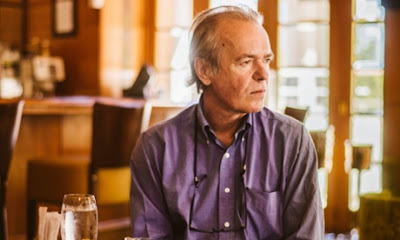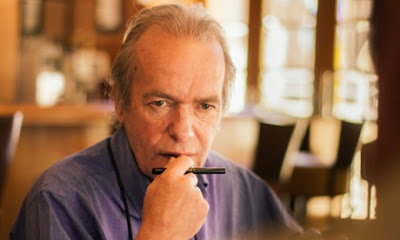(from theguardian.com
by Geordie Williamson)
Martin Amis: “It became accepted that you could say whatever you fucking well liked about me because I didn’t earn it.” Photograph: Tanya Voltchanskaya
Martin Amis has not quit smoking so much as his smoking has gone digital. In place of the once ubiquitous leather pouch filled with bespoke blended tobacco and Rizla packets thick as cheque-books, he wields an e-cigarette, albeit with the same insouciance. The red glow of its tip works like a laser pointer, describing exclamation marks and swirling semi-colons in the air.
During the hour we spend holed up in the empty bar of a hotel in downtown Perth, the West Australian sun doing its best to melt the tarmac outside while we shiver in the Antarctic-level air conditioning, Amis’s speech tacks and swerves, just as it did beneath the sallow fug of his analogue smoking days. Anathemas and admirations roll off his tongue as though it were a production line.
This shift in habit may be a concession to his no-longer-new home, America – the nation where, as TV dramatist Dennis Potter once explained, it is easier to pull a gun than a cigarette. And gun culture, it turns out, is very much on Amis’s mind. “Going to America has sharpened my sense of the incredible contradictions in American life and its institutionalised illusions and insanities.”
He explains: “I read a very funny piece by Henry Porter in the Observer. It was just after everyone was talking about intervention in Syria, following the chemical weapons attack there. He ignored Syria but claimed that the world could not stand idly by while Americans’ kill one another at a rate of 87-odd gun-related deaths a day. What was needed there was a humanitarian intervention!”
This modest proposal evidently appeals to Amis, just as the National Rifle Association’s tentacular reach appals him. It is an organisation “exponentially more powerful” in the US today than during the 70s and 80s, he says, and its aims and ends are utterly at variance with public opinion.
Martin Amis: "It poisoned the whole thing - it took food off my table". Photograph: Tanya Voltchanskaya
It is also patently daft: “The second amendment – the right to bear arms – is meant to be an insurance against tyranny. But, if there were a real tyranny in America, a lot of good ol’ boys with shotguns would have no chance against the secret services and an active army bent on its enforcement.”
Of course, as Amis readily admits, the Brooklyn borough where he and his family are based, with its tolerant, well-heeled, cosmopolitan outlook, bears little relation to the dystopian America he outlines. “The first proposition about America, before you talk about anything else, is Henry James’ remark that it is more like a world than a country – the Mississippi has nothing in common with Massachusetts.”
Breaking off for a moment to watch some would-be mining magnates clump past the windows in designer jeans and cowboy boots, he adds: “Perhaps Perth is a different country; I don’t think it’s a different world.”
And yet it is Britain that still claims his novelistic attentions. In Lionel Asbo: State of England, published last year, Amis turns his fire on a tabloid culture largely created by Australia’s best-known newspaper owner. Is Rupert Murdoch to blame for the porn-addled, celebrity-obsessed milieu that his most recent fiction explores? Amis furnishes a typically nuanced response. “It’s very chicken and egg. Is it that Murdoch’s papers corrupted the populace, or the fact that the populace laps it up – would lap it up anyway?”
He leans in, indicating anecdote: “In her final months [Princess] Diana was being shat upon by the tabloids - basically for sleeping with an Arab. When she died, these same papers were astonished by the millennial wave of emotionalism that swept the country … [One paper] had a print-ready story about what a slag the Princess was, and they had to pull it at the last moment. It was replaced with an image of Diana as an angel, ascending to heaven.”
Amis leans back, lesson concluded: “The press is more vicious than the populace.” So it is a matter, then, of class resentment, unstoppered by newspapers for their own purposes. The author nods. “It’s hard to disentangle what was present in the national psyche to begin with, and what was added. It does seem peculiarly British to want to destroy eminence – though often it’s an unearned eminence, more plain ubiquity – and once the boot has been applied, there’s a huge queue of people wanting to do the same.”
Martin Amis: "I had to know: does Elizabeth marry Darcy?" Photograph: Tanya Voltchanskaya
This attitude has been bolstered by the treatment Amis received at the hands of much the same press – in particular over his 2003 novel Yellow Dog. “To say it got bad reviews is not what happened. It got 50/50 reviews and I’m quite happy with that. But the broader response was virulent – everyone who could hold a pen had a go.”
When I mention the infamous piece by Tibor Fisher, which compared the experience of reading the novel to happening upon a favourite uncle masturbating in the school yard, Amis levels a hard stare: “It poisoned the whole thing – it took food off my table. And that, by a fellow novelist ...” He shakes his head. “I tried to to ignore it all. But, when you pass a newsstand and catch a headline that reads, essentially, ‘this stuff by Martin Amis is shit’, there’s no getting away from it.”
The roots of this tall poppy syndrome lies with his father, Kingsley, Amis believes. “I think there’s a certain peculiarity in my case – being the son of – which if anything was a slight boost when I started out. Then the culture changed: it became a curse. I was tainted by heredity – by inherited elitism. And so it became accepted that you could say whatever you fucking well liked about me – because, so to speak, I didn’t earn it.”
And yet Martin Amis has produced a fair portion of the most electrifying English novels of the last four decades – works shaped in a manner so against the grain of his father’s cranky yet clubbably conservative style that he claimed to find them unreadable. Who, then, had provided the initial impetus for Amis to take an interest in literature? Who had backed him up? His stepmother, novelist Elizabeth Jane Howard, whose recent death at the age of 89, inspired Amis to produce a moving prose eulogy which appeared in the unlikely venue of the Mail on Sunday.
“My mother’s household had collapsed” says Amis. “She was living on the Fulham Road in place that was never locked – a case study in boho laxity – and basically she was very unhappy and had a crack-up.” Amis goes on to unsentimentally describe a miserable adolescence: a rebellious older brother soon moved out and Martin found himself living in the home of what the family’s Welsh housekeeper winningly called his father’s “fancy woman”.
“I was averaging an O level a year,” explains Amis. “I was a real mess – not druggy or anything like that – just adrift, alienated in a non-combative way. And then Jane got me going on literature. She gave me a reading list and began leerily with Pride and Prejudice and, after an hour I went and knocked on her study door and said: “I’ve got to know: does Elizabeth marry Darcy?” I expected her to say, “Well, you’ll have to finish it to find out but she said (perfectly imitating an aristocratic swoon): “Yes!”
I am only just absorbing the knowledge that the creator of John Self, Keith Talent, Clint Smoker and Lionel Asbo – those proletarian paragons of the unexamined life – was brought to literary life by Jane Austen, when the hovering publicist calls time. One last question, then: kids.
I ask Amis if having daughters has changed the way he writes. At this, his attitude visibly sweetens: “I think it has an effect. You use a different part of your heart with girls.” And literary ambition? Do any of his children have it and if so, how does a writer carrying the taint of heredity respond to the signs? “With pleasure,” Amis replies



No comments:
Post a Comment